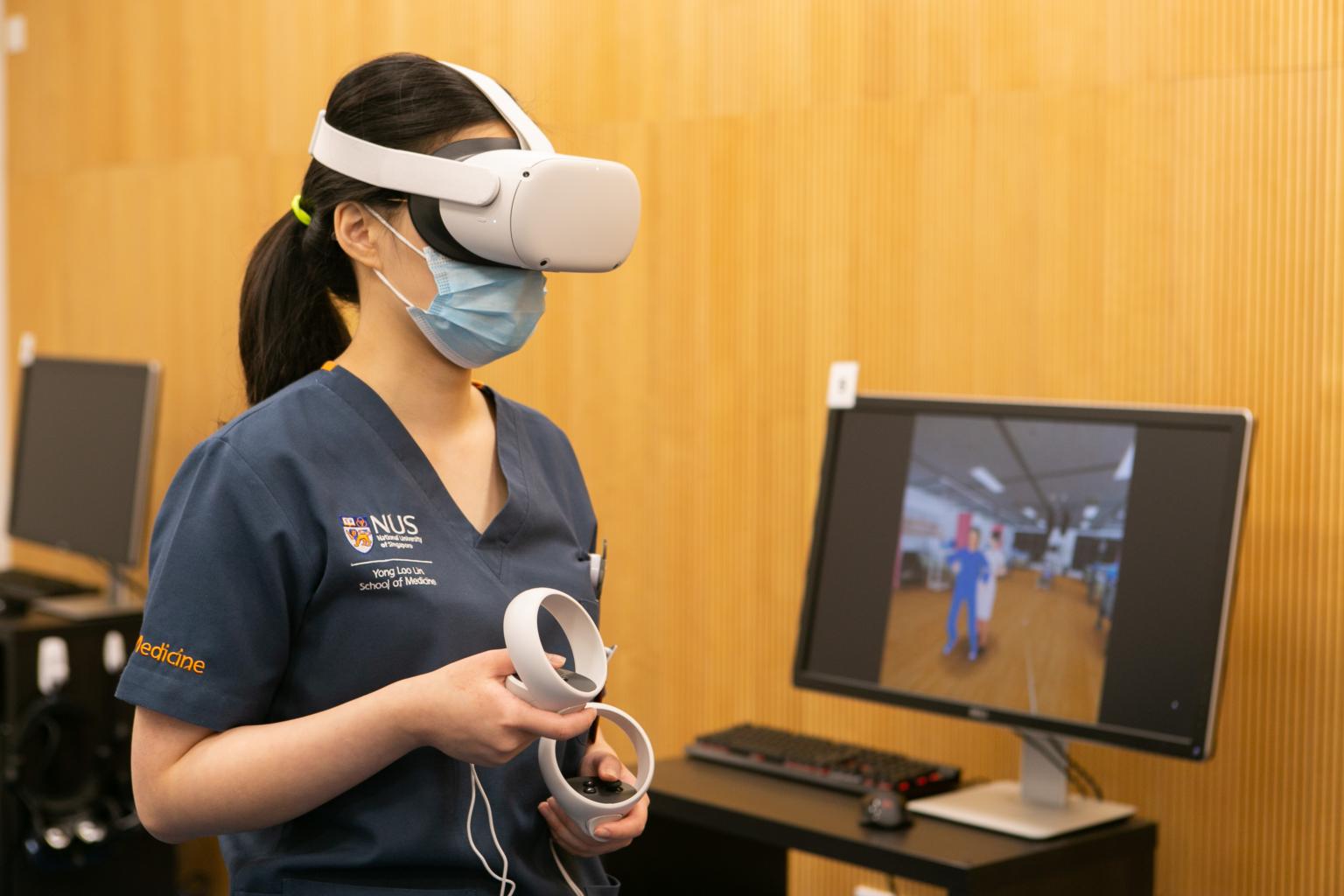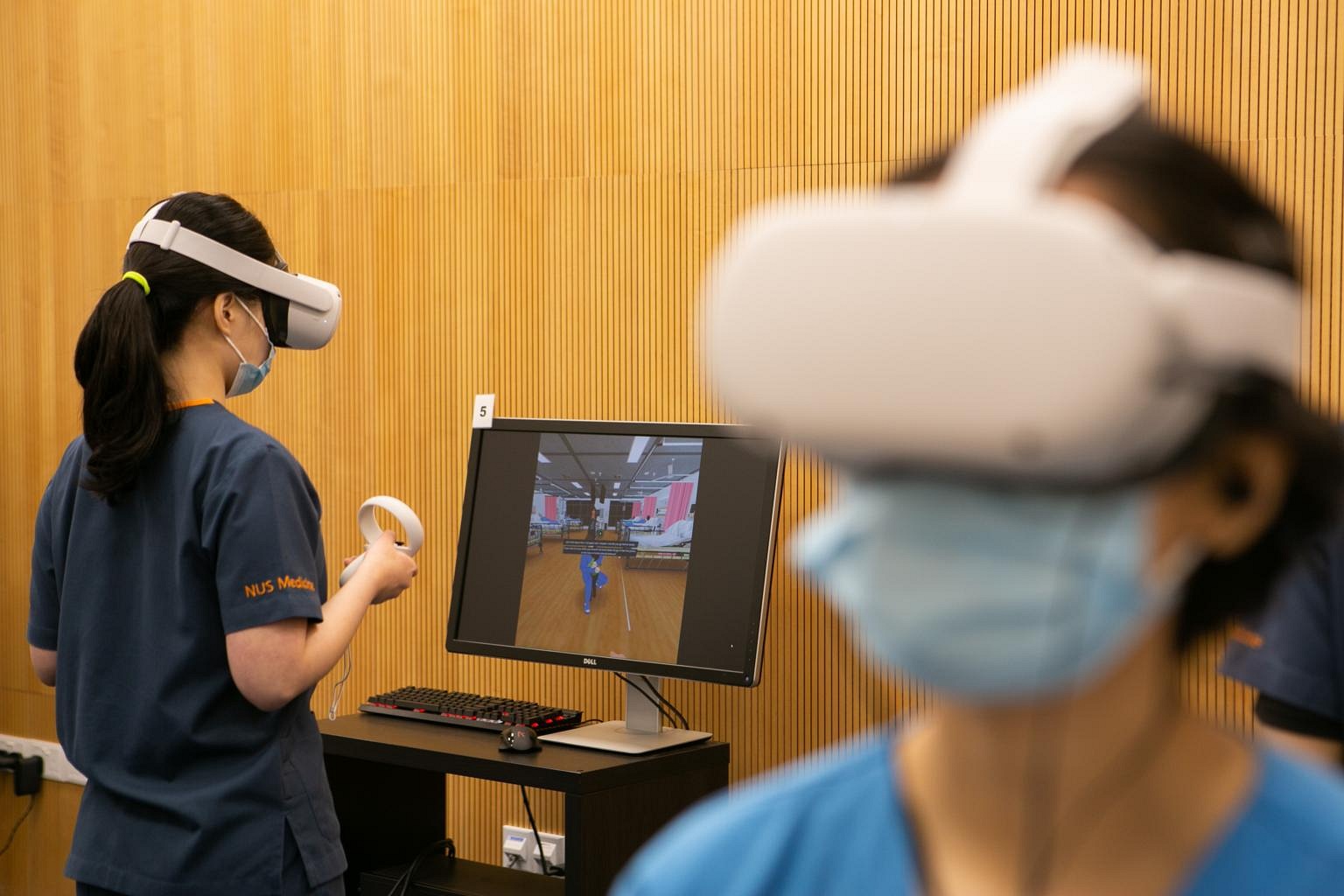New VR programme teaches medical, nursing students how to manage agitated patients
Sign up now: Get ST's newsletters delivered to your inbox

The NUS Yong Loo Lin School of Medicine has developed the virtual reality programme for medical and nursing students.
PHOTO: LIANHE ZAOBAO
SINGAPORE - The National University of Singapore's (NUS) curriculum for medicine and nursing students will soon include a virtual reality training programme that teaches them how to deal with a violent patient.
The rise in mental health issues, made worse by the effects of the Covid-19 pandemic, has increased instances of violence towards healthcare workers, according to Assistant Professor Cyrus Ho from the Department of Psychological Medicine.
To equip nursing and medical students with the skills required to handle agitated patients, the NUS Yong Loo Lin School of Medicine has developed the Virtual Reality in Agitation Management (VRAM) for medical and nursing students.
In a media interview at NUS, Prof Ho and Assistant Professor Shawn Goh from NUS Nursing said they have seen healthcare workers being verbally abused, and kicked and spat at by patients.
Drawing on their clinical experiences, they developed VRAM to play out a scenario where a patient experiencing drug-induced psychosis starts to act erratically, attempts to harm healthcare workers and holds a child hostage.
The simulation includes several distractions, such as noises from a television in the ward, requests from nurses and complaints from irritated family members.
Students wear a VR headset and hold controllers to navigate through the simulation.
They are given options on how to deal with the situation, such as choosing the right words to say, giving the patients the right dose of medication and whether to physically restrain the patient if the need arises.
If the student picks all the right options, the virtual patient will calm down and retreat to her bed.
In the worst-case scenario, the patient will make a break for it and run out of the ward.
"The VR setting makes it a safe environment for students' learning as the wrong response options will not result in harm to anyone. Instead, they learn the appropriate action to take, which will then help them manage real-life scenarios well and avoid threatening consequences for both patients and healthcare workers," Prof Goh said.
Work on the programme started in March 2020, with trials conducted from August 2021 on 65 medical and nursing students.
The compulsory programme will be rolled out from next month for fourth-year medicine and second-year nursing students as part of a larger module called Managing Aggression using Immersive Content .
The three-hour module also includes a lecture on the theories related to verbal de-escalation and a hands-on workshop on how best to physically restrain patients.
Students in the trial said they found the VRAM programme effective.

Second-year nursing student Isaac Soh, 22, said: "The simulation is tactile in the sense that you feel a shake when the patient throws objects at you. In a situation like this, one might freeze up, so the simulation helps me to think on the spot."
Another second-year nursing student, Miss Chloe Chia, 20, said to avoid getting hurt, students are not allowed to handle agitated patients during their hospital postings.
So this programme provides them a safe space to make mistakes without the worry of getting harmed.
"The programme allows me to be exposed to things that I cannot be exposed to while still in school. I made a lot of wrong choices on purpose to see what will happen, and to learn from it," she added.
Prof Ho said: "Moving forward, we will see more distressed patients, and healthcare workers need to have an empathetic response while collaboratively making decisions under pressure.
"With the blended learning approach, we hope to provide more holistic learning to help future generations of healthcare workers learn the skills of managing agitation while practising empathy and compassion."


